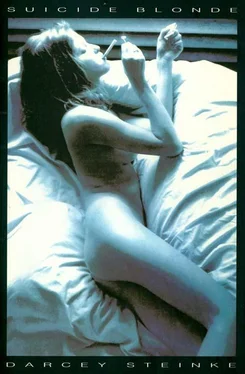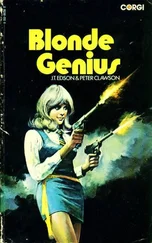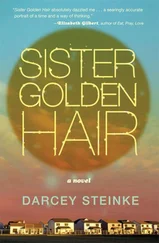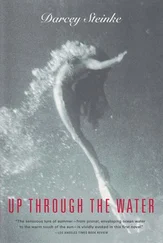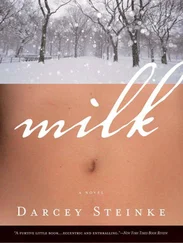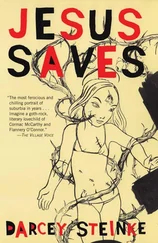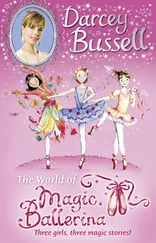He smiled sheepishly, leaned back against the sink. “Because I'm miserable.” He said this so calmly, as if he had said, “I saw a cute little dog today,” it frightened me.
“About what?” I asked, though I knew he didn't have one answer. His eyes went away from me and he sat at the table fiddling with a spoon left over from breakfast. Was he thinking of how Kevin would look in a tux? How he would feel near his bride? Bell lowered his head. It was Kevin.
“Sometimes I hear a ringing like a soft bell and it always takes me a minute to realize it's my own heart.”
“I think you should move out,” I said. His incessant adolescent melancholy made me sick.
“Because of him?” He looked up.
“Because you're faithless. All you can do is dream about old lovers.”
He softened his features, looked at me like I misunderstood him. “Kevin and my past,” he said carefully, as if speaking to a child, “are no threat to you.”
“You don't make me feel safe,” I said. Bell had started to feel more like a brother than a boyfriend.
At this he stood, moved toward me, grabbed my shoulder. “I can hardly take care of myself,” he said. When he saw my expression didn't change he stepped back and shook his head. “Let's face it, your time clock has gone off, it's ringing like a car alarm, all of a sudden you want a big house in the country and lots of children.”
“You know it's not that. Tell me,” I spoke slowly, because I was angry and didn't want to slur my words, “that I am the last thing between you and the total homosexual life you fear.”
“I can't believe you're saying this!” He brushed by me and went into the bathroom, locked the door behind him.
I stood very still, heard Bell run water into the sink. I knew he was running cold water over his wrists, he was convinced this calmed him. I went into the kitchen and got a shopping bag from under the counter, noticed the metallic container of Ajax, the mousetrap still baited with an old piece of Brie and the flowerpot full of white granite that Bell had used to force narcissus bulbs last winter. The morning light seemed suddenly bright and the paper cracked loudly as I loaded underwear from the shoebox I kept at the top of my closet. I took T-shirts and a sweater. I went to the alcove, to the little marble-top table where I left my keys, I heard Bell fidgeting behind the bathroom door.
“I'm breaking up,” he said, “and no one cares.”
I thought, Even love has its limits , and I couldn't believe this hadn't occurred to him. Hadn't he learned anything from his parents? Lovers? Even friends? You had to act a prescribed way to be loved. I heard him shift his body weight and the water stop. Putting my lips to the cool paint of the door I whispered, “You can't have two lives, Bell. You'll ruin everything and we'll both be left with nothing.”
I LIT SEVERAL PRAYER CANDLES IN GRACE CATHEDRAL. ONE FOR Bell, one for my mother, my father, his wife, her kids, one for Madison, one for Pig, one for myself as a little girl. Then I lit a few for abstractions: courage, honesty, sanity and kindness. The flames rose from gold glass cups. I emptied my pockets of change, let the coins plunk into the tin box. I thought of all the other places candles burned, in Hindu temples, little Chinese dens, the formal gardens of Japan, satanic churches in the California hills. I thought of apartment fires where the dead are laid out on the sidewalk and of the blue gas crown on the oven at Bell's.
I knelt at a side chapel, the lushest one with a purple fairlane, rosette windows and a life-size crucifix. There was incense and a big vase of roses and violets. The stone walls were draped with tapestries, biblical scenes: the raising of Lazarus, and Rachel by the well. The miserable Jesus looked like Bell, though there was something knowing around the eyes I attributed to my father. Maybe it was because he was a minister and, like dogs and their owners, they had begun to resemble one another.
My knees were mashed into the burgundy cushion. I looked up at the figures of saints. Some of the women's expressions, an ecstatic submission, reminded me of the expressions on posters outside X-rated theaters. I remembered the story of one saint, a virgin, who cut off her breasts rather then succumb to a rapist. I made myself think God is dead , but it seemed dangerous. Then I thought, my pussy is the same color as the carpet. This comforted me somehow. I relaxed a little, saw how the sepia light from the window shone on Jesus's face. I knew that it was comforting to have someone around who knew all the bad things about you, the horrible things in your past. . like a lover or a close friend, and I knew this was the purpose and place of Jesus. I took down the cord and walked to the altar. I stared into Jesus's raised eyes, then pushed my hips into his pelvis so it rubbed on the carved girth of cloth. A tightness came. I kissed his forehead, his upturned eyes, his open mouth. My tongue wiggled between his parted lips, I pushed against him and the cross rocked. Inside my tongue scraped the rough unlaquered wood. I tasted blood and sprang back, saw, like the momentary confluence of stars, how everything was connected. . my father fucking around, my embittered mother, Bell fucking boys, me fucking the stranger, my own phantom longing. .
CARMEN'S WAS DARK. I HAD TO STAND BY THE DOOR, LETTING my eyes adjust to its shimmery walls. The bartender mixed drinks in two silver cups. There was no music, just the continuous white noise from several televisions. I ordered a shot with a beer back, then asked the bartender, an older woman with spiky hair, what she knew about Madison.
“She's a girl like anyone else.” She shrugged while drying a highball glass. The place seemed less exotic than last time. I drank fast and scanned the black-light murals. The nearest one was of an alligator leering at a nude woman. I ordered another shot, watched a drunken couple make out at the end of the bar. The man squeezed his fingers between her legs, then smiled like an idiot. The woman's hair was dirty, strains separated in shiny red cords down her back. Each time they pulled apart, they drank quickly and seemed ridiculously shy.
For a while, staring at my paper bag of clothes, my freaked-out eyes in the mirror behind the bar, I convinced myself I would go back to Bell. He was the only man that ever made me feel in life instead of just a spectator, and if he did that by fear and pain, it was still better than when I looked numbly at some man on the couch thinking, I will leave you soon. I got another beer and thought of Bell and me in a big apartment on Nob Hill, how we would have dark paintings and beautiful wooden bowls. Bell would have a job producing movies and I'd be a photographer and we'd eat tabouli and make our own Christmas cards and name our baby India. Our bed would be thick with patterned blankets, quilts and cranberry satin pillows. But the dream place bled into a starker room, Bell asleep on the futon, me awake at the window — our life as raw and painful as a bloody bone.
I was still angry about Bell's reference to my biological clock. To think of it was ridiculous — an old-fashioned alarm, that seemed a cartoon of the real angst. . a vague sense that it was time to change. It began with noticing babies on the street, their funky sweaters and adorable little shoes. I noticed pregnant women too, how they seemed so positively preoccupied. And after so many lovers, the purity of the mother-child relationship became so appealing; there was no doubt your baby loved you. There was embarrassment too, at still being a maiden, because there were women in the beginning of that stage, fresher, more energetic and better at it than me. This sometimes made me feel ridiculously jealous. The biological clock was a feeling that it was time to move from one phase to the next, more advanced one. It was a positive and mature thing really, though men made it sound like a nervous disease.
Читать дальше
